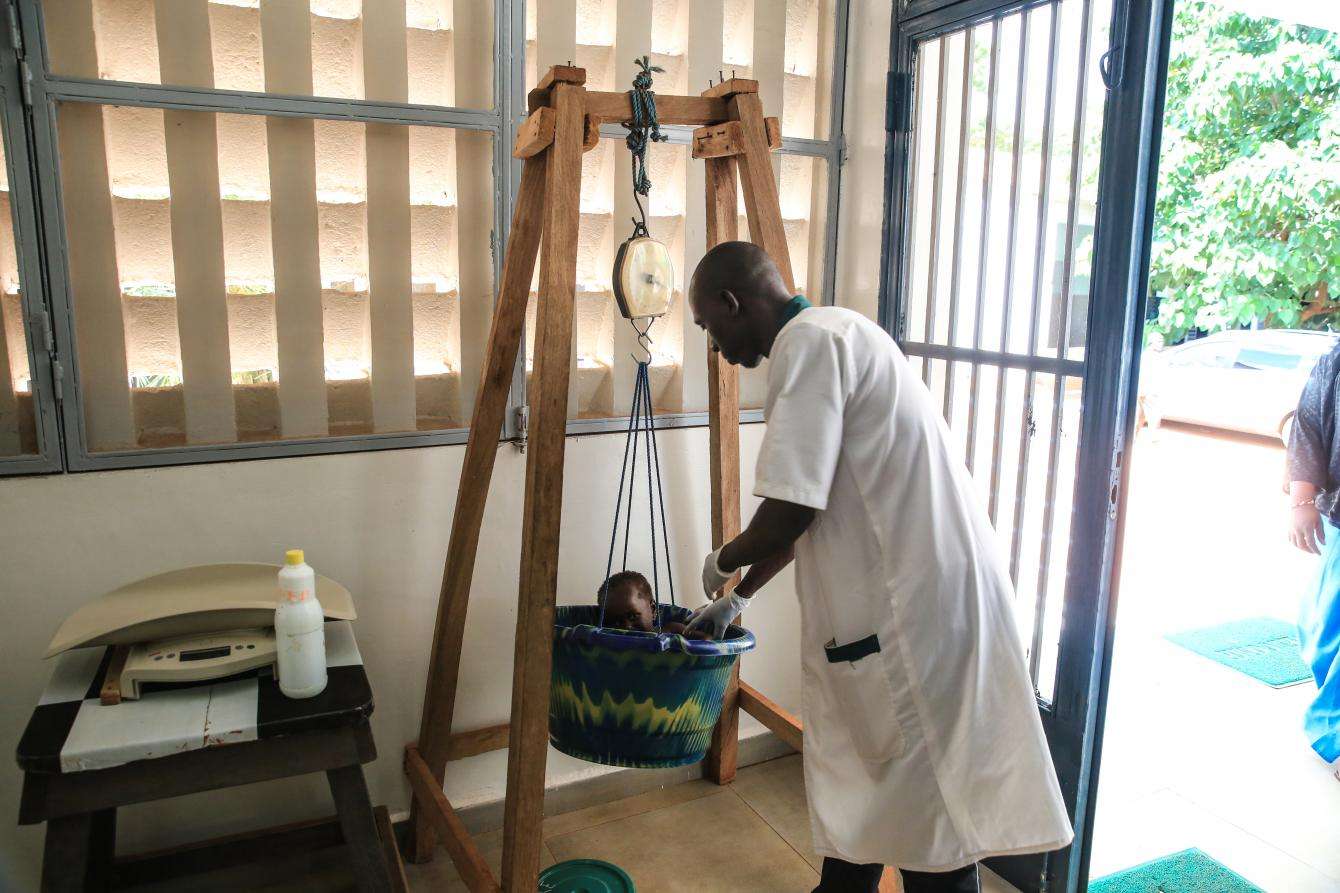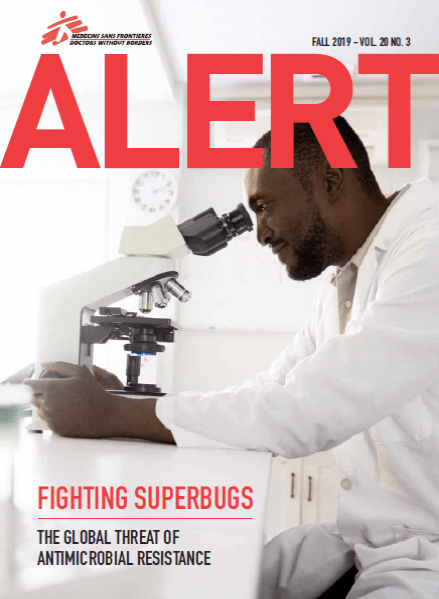Mali’s rains fall heaviest in the southern region of Koutiala, a center for cotton farming once known as the “white gold” capital. The wet weather unfortunately also provides ideal conditions for mosquitoes to breed—and for the spread of malaria. Malnutrition is endemic here, contributing to high mortality rates. In Koutiala, one in four children does not live to see their fifth birthday.
Doctors Without Borders/Médecins Sans Frontières (MSF) runs one of our largest pediatric programs in the world here in Koutiala city. As the rainy season starts, admissions increase and can reach up to 1,000 patients per month during the malaria peak, which usually occurs between July and December.
In addition to the dangers posed by malaria and malnutrition, MSF became concerned about another threat facing children in our care. Several years ago, MSF noticed that 60 percent of patient deaths at Koutiala hospital were related to sepsis of an unknown cause. Sepsis is a complication triggered by an infection elsewhere in the body that has spread to the blood and can lead to tissue damage, organ failure, and death. At the time, most patients with sepsis were treated with broad-spectrum antibiotics, which are generally effective against a wide range of bacterial infections. But in most of the cases in Koutiala, these normally reliable drugs didn’t work, and patients were dying very quickly—often within the first 24 to 48 hours after admission.
“We realized if patients are not responding to the antibiotic, maybe there is a resistance problem,” said Dr. Nada Malou, a microbiology and antibiotic resistance (ABR) surveillance advisor with MSF’s medical department. Currently based in Paris, she worked in Koutiala in late 2013, when the team was trying to solve the mystery of this high mortality rate. ABR often develops from overuse and misuse of antibiotics; it occurs when bacteria develop the ability to defeat the antibiotics designed to kill them.
MSF has been running a comprehensive pediatric program in Koutiala hospital since 2009 aimed at reducing morbidity and mortality of children under five. The hospital includes a pediatric unit, an intensive therapeutic feeding center for malnourished children, an emergency department, and an intensive care unit (ICU). In 2018, the team at the hospital conducted 160,000 outpatient consultations and supported 37 of the 40 health care centers in the broader Koutiala administrative region, which is home to more than 500,000 people.
In clinical settings like Koutiala, the incidence of ABR can also increase due to lack of treatment follow-up or adherence, inadequate diagnosis tools, and poor hygiene and infection control practices. Many patients admitted to Koutiala with malaria also presented with some sort of bacterial infection, so a new approach to diagnosis and treatment was needed.
Setting a standard for microbiology
After negotiating with the Malian Ministry of Health, MSF was given permission to add a microbiology department to the hospital’s central laboratory, which already included a hematology department (for blood cell counts and pre-transfusion blood tests) a biochemistry department (for testing organ function such as kidney and liver), and a blood bank (for transfusions). This microbiology department, which opened in 2014, allowed doctors to properly diagnose the cause of sepsis in their young patients and recommend the most appropriate treatments. It was the first lab of its kind built by MSF and continues to be the prototype for all new MSF microbiology labs today.
There were many logistical challenges to building and supplying the lab, and there is still much hard work to be done to keep it operating effectively. “We didn’t realize that creating a lab was just the first step,” said Dr. Malou. The team at the hospital had no experience with ABR, and years of training followed. It began with creating a training program for Ministry of Health interns from across the country. Interns spent one month in each laboratory department under the supervision of a lab technician.
One of the first interns MSF trained was Astan Dicko, who is now completing a master’s degree in microbiology. She is also MSF’s bacteriology supervisor. One of the biggest risks of ABR is the spread of resistant bacteria between patients in the ward. When a patient is diagnosed with ABR, Dicko is responsible for telling the team so that the patient can be immediately isolated.
“Once the lab has the results, they’ll inform me if it’s ABR,” said Salimata Traoré, MSF infection prevention and control officer. “At that point, I implement the necessary measures to put the child in isolation so that the infection doesn’t spread.”
This year the pediatric department moved into a newly constructed, two-story, 185-bed facility that can accommodate the large influx of patients during seasonal peaks. The extra space and new layout enable improved infection prevention and control measures to help halt the spread of bacteria within the hospital. A new area in the ICU dedicated to patients with ABR means they can be isolated within the unit and receive the close monitoring they need.
It took two years for the microbiology program to be fully implemented. During that time there was no antibiotic steward on-site to advise on treatment of patients with ABR, so results had to be sent for analysis to an international network of MSF experts working with our telemedicine program. Today the antibiotic steward is Dr. Diawara Moussa Karim, who first worked with MSF in Koutiala in 2010.
“We’ve treated lots of children with success,” said Dr. Karim. One of the most unusual cases the team witnessed was a child who was admitted with meningitis and had also developed a bacterial infection. The child was first treated with ceftriaxone—an antibiotic that is usually successful in treating a wide variety of infections in Koutiala hospital—but their condition did not improve. A blood culture and analysis showed that the bacteria was in fact resistant to all antibiotics tested, except one very old antibiotic the team had stopped using years prior. They quickly switched the treatment accordingly, and shortly after the child was able to go home without any signs of infection—thanks to accurate diagnostics.
When a child is brought to the hospital with a fever, they are given a few basic exams. For example, doctors test blood hemoglobin levels to look for anemia and run a rapid diagnostic test for malaria. If the child has other symptoms like hypothermia, tachycardia (an abnormally fast-beating heart), a low white blood cell count, or is refusing to eat, the doctor might suspect an infection. It can take at least 24 hours to receive a positive reading from a blood culture indicating the presence of bacteria, but children admitted with symptoms this severe need treatment immediately.

Improving surveillance
The key to successfully managing ABR is to gather enough results to statistically show the resistance rates for certain antibiotics in a hospital. “It took us three years to have enough results [in Koutiala],” said Dr. Malou. “This is what we call surveillance.” The lab now collects about 6,000 blood cultures each year, which are analyzed to determine what antibiotics can no longer be used. “This is what we call a hospital-based antibiogram,” said Dr. Malou.
An antibiogram is a chart that shows how susceptible different strains of bacteria are to a variety of antibiotics. The results are used to inform empirical treatment (i.e. treatment protocols based on probabilities), so that doctors don’t have to wait for microbiology results to come back before starting targeted treatment. Antibiogram analysis helps ensure the likelihood of selecting the best antibiotic for the patient, thereby reducing the growth of antibiotic-resistant strains of bacteria. When the wrong antibiotic is used, only some of the bacteria are killed, leaving space for resistant bacteria to multiply.
The microbiology lab in Koutiala is now a reference center for the surveillance of antibiotic resistance in Mali
The team in Koutiala hospital and MSF’s medical department advocated for more than two years for the lab to be audited by Mali’s Ministry of Health so that it could be included in the national surveillance system. After a successful audit, the facility is now recognized as one of the reference laboratories for antibiotic resistance surveillance in Mali.
This means that the data collected from Koutiala hospital can help other hospitals in the region—which do not have access to a microbiology laboratory—adapt their empirical treatments as well. The data will also be shared with the World Health Organization’s Global Antimicrobial Surveillance System (GLASS), which monitors ABR around the world.
“I hope that Koutiala hospital becomes a reference of training in the management of multi-drug resistant bacteria,” said Dr. Karim, who looks forward to sharing knowledge with researchers and clinicians across Africa and around the world. “I also want to … exchange experiences managing patients with bacterial infections.”




